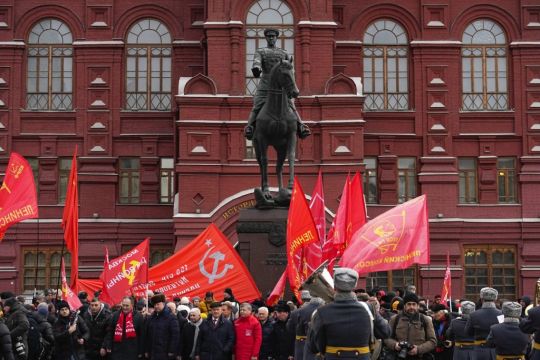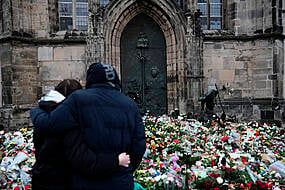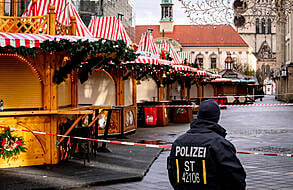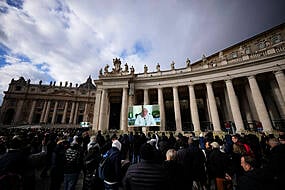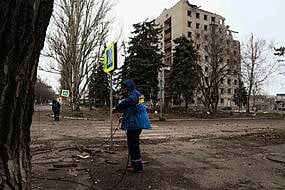Russian President Vladimir Putin has attended commemorations for the 80th anniversary of the Soviet victory over Nazi forces in the battle of Stalingrad – a long and gruelling fight which resonates in the current conflict in Ukraine.
Mr Putin laid a wreath at the eternal flame of the memorial complex to the fallen Red Army soldiers in Volgograd, the current name of the city, which stretches along the western bank of the Volga River.
The memorial is dominated by a 279ft sculpture of a sword-wielding woman, Europe’s tallest statue.
Afterwards, he said: “Now, regrettably, we see that the ideology of Nazism, in its modern guise, in its modern manifestation, once again poses direct threats to the security of our country. Again and again we are forced to repulse the aggression of the collective West.”
Mr Putin and other Russian officials frequently characterise Ukraine as a hotbed of neo-Nazi beliefs, although Ukrainian President Volodymyr Zelensky is of Jewish descent.
Referring to Germany’s recent decision to supply advanced Leopard battle tanks, Mr Putin warned that “a modern war with Russia will be quite different for them”.
“It’s incredible, but it’s a fact: they are threatening us again with German Leopard tanks with crosses painted on their armour,” Mr Putin said.
“And they are again going to fight Russia on the territory of Ukraine with the hands of Hitler’s followers, the Banderites,” he said, referring to Second World War-era Ukrainian nationalist leader Stepan Bandera who was widely considered to be a Nazi collaborator.
Stalingrad was renamed in 1961 as part of the Soviet Union’s rejection of dictator Joseph Stalin’s personality cult.
But the name Stalingrad remains inextricably linked to the historic battle that turned the tide of the Second World War.
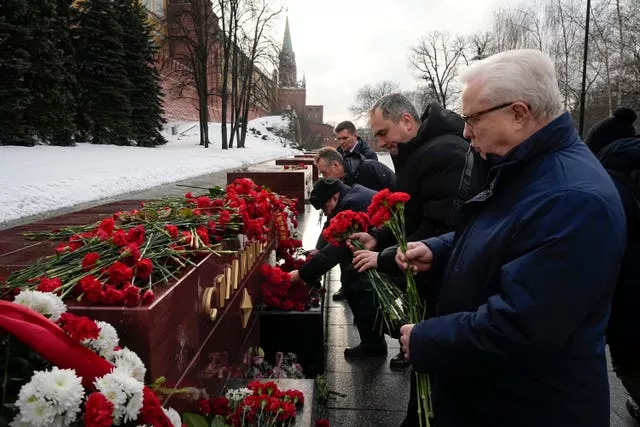
There have been calls for the restoration of the city’s old name but they have not received the Kremlin’s blessing.
The five months of fighting in Stalingrad between August 1942 and February 1943 is regarded as the bloodiest battle in history, with the death toll for soldiers and civilians reaching as high as two million.
Most of the city was reduced to rubble before Nazi forces surrendered on February 2 1943.
The Soviet victory was a major turning point in the European theatre of the Second World War and the battle remains an immense point of pride in modern Russia, lauded as a demonstration of military might and moral seriousness.
As Russian forces struggle to gain ground in Ukraine, politicians from the dominant United Russia party have been told to liken the Ukraine fight to Stalingrad, the newspaper Kommersant reported.
Some Russians on Thursday made the connection explicit.

“The achievement of our fathers and grandfathers, showing unprecedented heroism, valour and self-sacrifice during the defence of Stalingrad, still inspires our courageous soldiers who carry out responsible combat missions on the fields of the special military operation and defend the sovereignty, independence and security of our country,” said Russian Orthodox Church head Patriarch Kirill, using the official characterisation of the conflict that began nearly a year ago.
Communist Party head Gennady Zyuganov, after laying flowers at the Unknown Soldier memorial outside the Kremlin, said he hopes Russian forces will prevail in Ukraine.
“To do this, it is necessary to adopt the unique experience of the victorious Red Army, the Battle of Stalingrad, Oryol, Kursk,” he said.
Sergei Naryshkin, head of Russia’s foreign intelligence agency the SVR, said “no matter how many years have passed, the image of the unconquered city on the Volga, Stalingrad, will forever remain a symbol of the resilience and courage of our people, a strong spiritual support in the face of any external threats and challenges, in the face of any enemies”.
